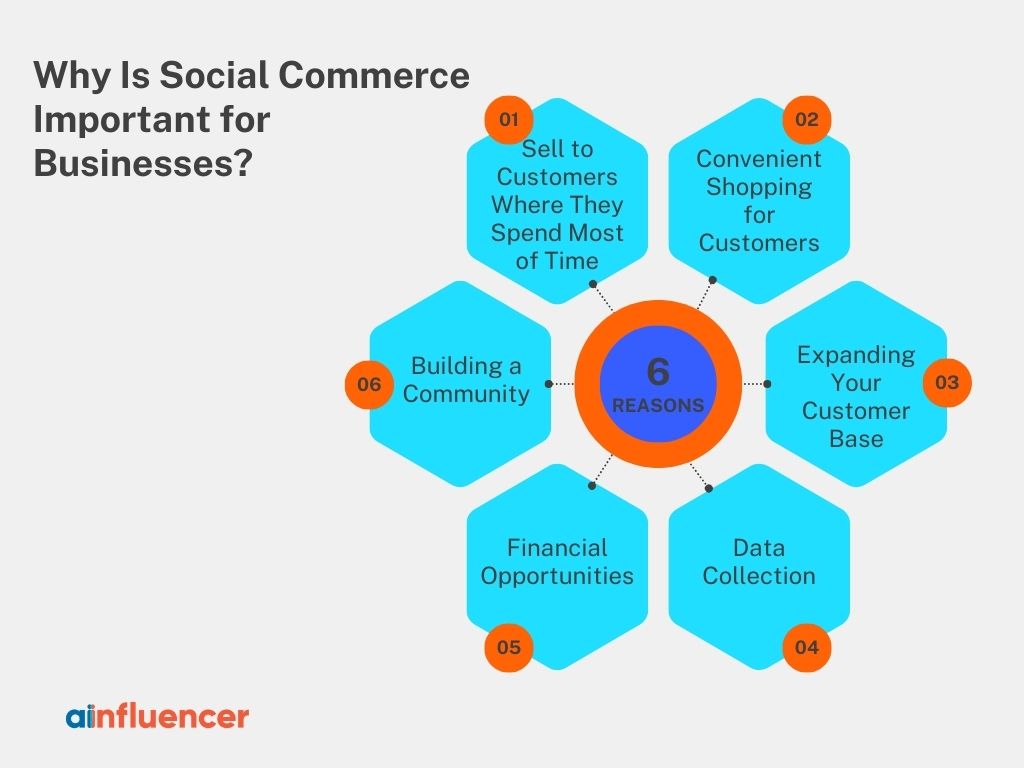Are you a brand owner looking to find billions of potential customers anytime? If so, try Social Commerce, which is more like the Money Mouth Face emoji! 🤑
While most of us are familiar with e-commerce marketing, which involves buying and selling online, social commerce takes place specifically on social media platforms. It’s like e-commerce but focused on selling products and services through social media. With social commerce, billions of users on social media can find your business, check out what you offer, and buy directly from the platform. So, it will widen your customers and shoot up your sales!
If you’re looking to develop or improve your social commerce strategy, keep reading to learn the definition of social commerce, why it’s important, and the best practices to follow.
Let’s get started with the basics!
What Is Social Commerce?
Social commerce means using social media platforms to advertise, buy, and sell goods. It allows customers to shop entirely within their favorite social media platforms, from finding products to completing purchases. In this sense, Social commerce is a part of e-commerce. It involves using social media platforms to make online purchases.
While different platforms support social commerce, it mainly happens on a select few. The leading social commerce platforms include Facebook, Instagram, TikTok, and Pinterest.
These platforms offer built-in features for social commerce, simplifying brand advertising and sales. Using these features and setting up an online store on each platform enables access to millions or even billions of social media users, allowing them to shop directly within their preferred app.
Social Commerce Vs. E-commerce: What Is the Difference?
E-commerce and social commerce are closely connected but have clear distinctions. E-commerce involves purchasing and selling goods or services online through various platforms, such as company websites or online stores.
Conversely, social commerce specifically involves transactions occurring on social media platforms. So, while e-commerce can happen on different online platforms, social commerce is limited to social media platforms.
Now, you may consider:
How Does Social Commerce Work?
Social commerce is when brands sell their products directly on social media platforms. They showcase their products with images and details like features, availability, and prices. Shop customers can buy the products without leaving the platform and complete the payment and checkout process right there. Pretty straightforward, right?
To make it easier for customers to find and buy their products, brands create content on social media that allows people to click on links to learn more about the product or buy it directly. Sometimes, brands also advertise their products by promoting this clickable content to specific groups of social media users.
The most effective approach for social commerce is influencer marketing and teaming up with influencers with large, loyal followers. When a popular influencer promotes your brand in a good way, it makes people trust it more. When they promote your products on their social media platforms, it boosts your brand visibility, increases brand awareness, and helps drive sales due to their significant number of followers.
If finding influencers seems like too much work, you might want to try a service like Ainfluencer.
Ainfluencer: The Key Ingredient for Social Commerce
Ainfluencer is a platform that acts as a middleman for brands and influencers, helping them connect and work together. For brands, Ainfluencer offers a user-friendly marketplace where they can easily find influencers based on various criteria, such as niche, location, follower count, and more, without any upfront costs.
Brands can start campaigns, select preferred influencers, or let influencers approach them. They can also negotiate prices through the platform’s chat feature. Ainfluencer provides benefits like secure payment handling, AI-powered influencer search, access to influencers’ stats, and simple campaign management.
If you’re interested in learning more about this influencer marketing platform, watch the following demo video to explore its features.
Signing up is free, enabling brands to boost their business without any financial investment.
Why Is Social Commerce Important for Businesses?
Developing and implementing a social commerce plan allows your company to connect with a vast number of people and create opportunities to sell, which can significantly boost your brand awareness and profits.
The importance of social e-commerce lies in its ability to sell to customers where they spend time, create a convenient shopping experience, expand your audience, collect data, boost sales, and create a community. With around 4.95 billion individuals worldwide using social media, social commerce offers a massive opportunity for brands seeking to expand their reach and enhance sales.
Below, we delve deeper into some of the main advantages of integrating online shopping experiences with social commerce.

#1 Sell to Customers Where They Spend Most of Time
Marketing and selling your products on social media platforms allows you to reach customers who already spend time on these platforms. This means you can target individuals actively seeking new products to purchase. Social commerce isn’t just beneficial for large businesses; smaller businesses and individual brands can also capitalize on its opportunities.
#2 Convenient Shopping for Customers
Online shopping is already a convenient way for people to research and buy products without leaving their homes. Social commerce takes this a step further by enabling users to make purchases directly within their favorite social media platforms. By adopting a social commerce strategy, you can enhance the overall shopping experience and satisfy both current and potential customers.
#3 Expanding Your Customer Base
Social commerce provides an excellent opportunity to reach a broader audience. By establishing a presence on social media platforms and leveraging social commerce tactics, you can connect with users worldwide. This expanded reach allows you to grow your customer base and forge relationships with new buyers.
#4 Data Collection
Many social media platforms that support social commerce offer valuable data and insights to sellers. This data can be used to segment your audience and target the people most likely to be interested in your products. Additionally, you can conduct surveys and polls to gather customer feedback and set up your offerings accordingly.
#5 Financial Opportunities
Social commerce presents significant financial potential due to the vast number of active users on social media platforms. Moreover, social commerce statistics and projections indicate that by 2025, approximately $80 billion worth of goods and services will be purchased through social media channels. By using social commerce, your business can tap into this revenue stream and stay competitive in the market.
#6 Building a Community
Social media platforms are designed to facilitate connections between people worldwide. By engaging in social commerce, you can transform online shopping into a more social experience. Encouraging user interaction and providing interactive features can make shopping more enjoyable and support a sense of community around your brand.
Now, let’s take a look at some examples to get insights into conducting social commerce!
Social Commerce Examples
One effective example of social commerce is Ralph Lauren Home’s social commerce strategy. Social connections often influence Home decor purchases, making social shopping a fitting approach.
Similarly, Procter & Gamble, offering a wide range of products, can leverage social commerce for direct-to-consumer marketing. For instance, a busy mom might come across a live stream on Facebook where another mom shares her positive experience with a foundation, prompting the first mom to make a purchase based on the recommendation.
To Wrap Things Up
Social commerce is where online shopping and social media come together. This guide helps you succeed in this marketing effort, highlighting what it is and how it works. Using influencer marketing platforms allows your company to partner with influencers and promote products or services to a specific group of people on social media. This approach can help you reach a wider audience and connect more closely with customers.
With Ainfluencer‘s all-in-one marketing platform, you can find influencers and create your influencer marketing campaigns for free. Give Ainfluencer a try today to collaborate with influencers and enhance your brand awareness.
FAQs
Social commerce is evolving with trends like augmented reality (AR) experiences, video shopping, sustainability, integration with messaging apps, mobile-first shopping, and the use of user-generated content for authenticity. These trends are heavily influenced by current e-commerce trends.
Livestream shopping is becoming increasingly popular, with many shoppers already using this feature. Additionally, there is a growing interest in virtual reality (VR) and AR experiences, enhancing the social shopping.
In 2024, TikTok, Instagram, and Facebook will be among the top social commerce platforms.
No. Social media marketing means advertising your brand and items on social media platforms. However, social commerce means selling products directly through social media. So, even though social commerce can benefit from social media marketing, they’re not the same thing.
![You are currently viewing What Is Social Commerce: [Definition + Inspiring Examples in 2024]](https://blog.ainfluencer.com/wp-content/uploads/2024/04/social-commerce-info.jpg)








